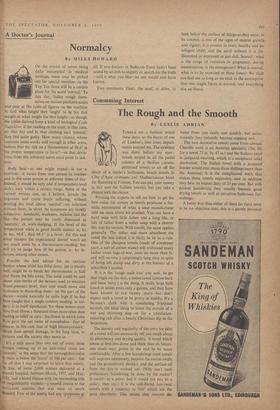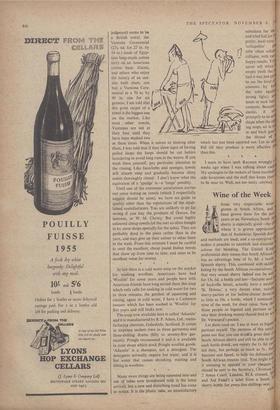Consuming Interest
The Rough and the Smooth
By LESLIE ADRIAN Pressing the experts to tell me how to get the best value for money in towels produced a for- mula reminiscent of what a soap manufacturer told me once about his product. You can have a hard soap with little lather and a long life, or lots of lather from a softer soap with a shorter life, was his version. With towels, the same applies generally. The softer and more absorbent the towel the less robust it is likely to be as a rule. One of the cheapest towels (made of condenser yarn, a sort of cotton waste) will withstand many locker room tugs-of-war, costs no more than 5s. and will survive a surprisingly long time in spite of being left damp and dirty at the bottom of a schoolboy's satchel.
If it is the 'rough male kiss you seek, to get that tingle on the skin, a union towel (cotton back and linen 'terry') is the thing. A really large bath towel in union costs only a guinea, and they have been known to last twenty years—but (loin expect such a towel to be pretty or cuddly. It's a he-man's cloth with a stimulating frictional scratch, the ideal thing to boost the morale of a wet and shivering dog—or for a circulation- restoring rub after a hearty Christmas dip in the Serpentine.
The density and regularity of the terry (or pile) of a towel will not necessarily tell you much about its absorbency and drying quality. A towel which seems at first less dense and thick than its luxuri- ous rivals may prove in the end to be more comfortable. After a few launderings most towels will improve immensely, because the cotton swells and the groundwork shrinks; and the surface oil from the dye is washed out. (Why can't such preliminary laundering be done by the maker'? it could—at a price; but it would not pay as a policy, they say.) It is the soft-fibred, low-twist towels with a tendency to 'lint' which are the post absorbent. This means they remove the water from you easily and quickly, but unfor- tunately they instantly become sopping wet.
The best decorative towels come from abroad. Chenille work is an Austrian speciality (26s. 9d. for a towel 23 in. by 47 in.) and the Italians excel in jacquard weaving, which is a sculptural relief decoration. The Italian towel with a jacquard border would cost about three shillings more than the Austrian; it is the complicated work that makes these towels expensive, and in addition they bear an import duty of 25 per cent. But with patient laundering they usually •become good drying towels as well as attractive bathroom fur- nishings.
A better buy than either of these (as there seem to be no objective tests, this is a purely personal Until one of the consumer associations carries out some testing on towels (which I respectfully suggest should be soon), we have no guide to quality other than the reputations of the estab- lished manufacturers. You are unlikely to go far wrong if you buy the products of Osman, for instance, or W. M. Christy. But avoid highly coloured cheap towels (of the sort so often bought in by some shops specially for the sales). They are probably dyed in the piece rather than in the yarn, and may give up their colour to other linen in the wash. From this stricture I must be careful to omit the excellent, cheap pastel Indian towels that show up from time to time, and seem to be excellent value for money.
At last there is a cold water soap on the market for washing woollens. Americans have had 'Woolite' for some years and people here with American friends have long envied them this soap which only calls for soaking in cold water for two to three minutes, the gentlest of squeezing and rinsing, again in cold water, I have a Cashmere sweater which has been washed in 'Woolite' for five years and still looks new.
The soap now available here is called 'Adamite' and it is manufactured by R. P. Adam, Ltd., manu- facturing chemists, Galashiels, Scotland. It comes in sixpenny sachets (two to three garments) and three-shilling drums (fifty to seventy-five gar- ments). Pringle recommend it and it is available in most shops which stock Pringle woollen goods. `Adamite' is a shampoo, not a detergent. The detergents normally require hot water, and it is hot water that causes shrinking, matting and felting in woollens.
Many more things are being squeezed into and out of tubes now (condensed milk is the latest arrival), but a new and disturbing trend has come to notice. It is the plastic tube, an unsatisfactory substitute for the and tried foil (or if prefer, lead) tube.
`collapsible' PI tube often refuse, collapse, with two happy results. Yoo never tell when empty (with the had it was just po to see the level of contents by hat the tube against strong light); 30 tends to suck bacl contents. Because elastic, it ref promptly to its oil. shape when the 0 ing stops, air is so in and back goes
.
the thread of
which has just been squirted out. Let us sti: foil till they produce a more effective Pi than this.
I seem to have spelt Racasan wrongly 0, weeks ago when I was talking about carp' My apologies to the makers of these excellent side lavatories and the stuff that keeps the to be near to. Well, not too nasty, anyway.







































 Previous page
Previous page